Stay in the know on all smart updates of your favorite topics.
People get more connected and technology becomes part of our daily life. Between 2014 and 2015 there was a 27% growth of internet traffic in Amsterdam. Eleven out of fifteen Trans-Atlantic data cables are connected with or go through Amsterdam and the AMS-IX is the second largest internet exchange point in the world. In 2016 Amsterdam was ranked second in the European Digital City Index. Do you work on a smarter city? Share your technologies here!
Smart Cities or Dumb Cities - a debate at OBA Oosterdok
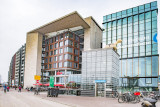
Toronto seems to become a testing ground for the urban development of smart cities. Sidewalk Labs, part of Google’s parent company Alphabet, will redevelop the city’s waterfront. Data will be used to design smarter, more sustainable designs, to handle waste better or to reduce our energy consumption. But with Google at the helm, data is also the capital of this city district: and what does that lead to? It is time to start the discussion with architects.
During the Architecture Residency of Do Janne Vermeulen we will organise a debate about smart cities on Tuesday 21 May. We discuss the developments of data in Amsterdam, look at the developments in Toronto and talk about the position of the architect. Through this debate we hope to feed the discussion from a design perspective.
What’s the question?
Architect in Residence Do Janne Vermeulen, architect and co-founder of Team V, visited Canada and is bringing the debate to the Netherlands. While reading, watching, writing and talking about smart cities, it is tempting to think in terms of technology instead of the city. Rather than “What do we want and how does smart technology offer a solution for that?” it is about “What possibilities does smart technology offer and what can we achieve with it?”
Privacy issues make the conversation even more difficult and sometimes make us long for the ‘stupid city’. But our spatial domain and the digital world are becoming more and more interconnected. Can we grow, densify and become more sustainable without smart systems? Is technology indeed the answer to our questions? What is exactly the problem with ‘stupid cities’? What are the benefits if we focus on digital technologies, analyse large amounts of data and provide the city with systems and IoT (Internet of Things) sensors? And what other means do we have? In short, a lot of questions to which smart technology might be the right answer. And maybe not.
Programme and speakers
Do Janne Vermeulen – Team V – Co-founder and architect
Meat Do Janne Vermuelen as our second Architect in Residence. She gives a short pitch about the role of big data in her field of expertise.
Marleen Stikker – Waag Society – Founder
Marleen Stikker supervises the digitisation of society with research and all kinds of initiatives from Waag Society. This evening she will share her views on the developments concerning Big Data. She also offers perspective on the role of the architect within smart cities.
Ger Baron – City of Amsterdam – Chief Technology Officer (CTO)
Ger Baron, the first CTO of Amsterdam, brings us up to speed on technological innovation and the digital transformation of Amsterdam.
Emil Zelic – Waterfront Toronto – Executive Director Project Management Office & IT
As an IT professional, Emil Zelic, who will fly in from Toronto, tells about where application and disruption of smart technologies meets design practices. He reflects on the progress and philosophises about the Smart City applicability in Amsterdam.
The lectures are followed by a debate between the audience and the speakers.
Smart Cities or Dumb Cities
Architect in Residence Debate: Do Janne Vermeulen, Team V
Date: Tuesday 21 May 2019
Time: Starts at 8PM / Door open at 7.45PM
Location: OBA Oosterdok, auditorium, Oosterdokskade 143
Language: ENGLISH
Tickets: € 12,50
Online tickets available at our ticket page
€300,000 available to build Platform for Cycling Innovations & Showcase Amsterdam as a Knowledge Cycling City
Are you . . .
* Passionate about the role that the bicycle plays in keeping Amsterdam and the metropolitan area accessible and livable?
* Playing an active role in sharing this knowledge internationally?
* Experienced with building digital platforms and innovation ecosystems?
If so, the City of Amsterdam and the Vervoerregio (Amsterdam Transport Region) could select your organization as the collaboration partner to support the following goals:
* Develop and share knowledge about cycling
* Stimulate innovation and experimentation in the field of cycling
* Profile Amsterdam nationally and internationally as a knowledge cycling city
* Stimulate bicycle use to achieve these goals
Why?
In its Multi-year Bicycle Plan (MJP), the municipality of Amsterdam profiles itself "nationally and internationally as The Knowledge City in the Field of Cycling.” According to the MJP, the City would like to create more room for experimentation in order to solve Amsterdam’s unique cycling challenges, and testing of innovative bicycle concepts plays an integral role in finding those solutions.
Amsterdam has been building on knowledge development in the field of cycling in a compact city, and the municipality is now taking a deliberate path toward a stronger profile of sharing knowledge and supporting innovation and experimentation. To achieve these goals, the municipality of Amsterdam and Vervoerregio seek support for the following activities:
1. Digital Knowledge & Innovation Platform
Knowledge sharing leads to concrete ideas, projects or initiatives. The winning proposal will need to detail plans for a digital platform which will be in both Dutch and English, through which knowledge and innovations concerning cycling in the Amsterdam region will be bundled and made accessible. It will provide a shared bicycle platform for companies, citizens, academic, municipality, and transport region and social organizations in the field of cycling for the Amsterdam region. The platform will also offer the opportunity to showcase Amsterdam as a cycling city internationally. The platform must be fully transferable, so that it can be managed and further developed by the municipality or third parties at the end of the term of the agreement.
2. Expanded Network in the Field of Cycling
The winning proposal will be charged with setting up, mobilizing, and stimulating a powerful network organization. Through this network, the makers, inventors, implementers and policymakers will share bicycle knowledge and will be empowered and supported to develop innovative ideas in close collaboration with the commissioning parties.
3. Receive Delegations
The Bicycle platform for knowledge sharing, innovation and experiment has a leading role in receiving international delegations, giving and organizing presentations, and arranging excursions for the many delegations that are expected in Amsterdam and throughout the region.
Interested?
Deadline for proposals is May 14 at 14:00 via TenderNed. All relevant documents and information can be found in Dutch via: https://www.tenderned.nl/tenderned-tap/aankondigingen/162544
Good Luck!
The wining proposal will play an important role in strengthening Amsterdam visibility as a cycling city nationally and internationally!
Looking for a job opportunity in the areas of smart cities / digital transformation
I am a Smart Cities Consultant, actively looking for opportunities in the areas of Smart Cities, Digital Transformation, Livable Cities, Sustainable Development, Urban Mobility, ICT/ IoT, Strategy Planning, Project Management, Urban Management, Urban Economic Development, Urban Governance, Feasibility Studies, Technical Research, and Development.
I hold a Masters degree from Germany with specialization in Urban Agglomerations. I would be happy to hear from you pointing out at any leads or opportunities.
Thanks in advance,
Kind Regards,
Anuradha
Finalists for ArenA Change the Game Challenge announced
Out of more than 180 international submissions, 35 appealing innovations have been selected. These finalists stand a chance to be used by the two million visitors the Johan Cruijff ArenA hosts each year.
In collaboration with Ajax, the KNVB and ID&T, the Johan Cruijff ArenA mounted the Change the Game Challenge to develop new, innovative services for visitors. Companies from all over the world have submitted a variety of products and services designed to enhance the visitor’s experience.
Help build an open data market and win 750,000 euro
Enter the competition and win up to 750,000 euro in co-financing for your idea for an open, trusted and fair market for data sharing. A market that is scalable and broadly applicable and that allows parties in the Amsterdam area to work on a smart, green and healthy region.
Are you an organization that is familiar with digital technology and do you know how to use your knowledge for a smart, green and healthy region? Register for this competition!
Proseed

About ProSeed
ProSeed is a vibrant and generously impactful series of meetups, events, and roundtables hosted around the globe in the technology space. It’s currently focusing on the APAC region with meetups in Singapore on 30th May, Hong Kong on 27th June, and Seoul on 25th July.
Who Will be There
ProSeed believes in making things happen with and for those who really matter by connecting, networking, and unwinding together. It’s a movement where startups, investors, thought leaders, media members, and innovators come together to amplify the process of decentralized reordering. It’s time to augment lives. It’s time to proceed.
Digital Perimeter
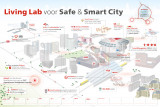
By implementing innovative smart & digital solutions, the digital perimeter allows us to experiment with applications that deliver safety & security while providing the visitor with an even better fan experience.
Please do share your comments and thoughts with us as we are currently exploring our technical options with partners within the eco-system.
The City Innovation Exchange Lab (CITIXL) and the City of Taipei Department of IT win International Award for A.I. Camera test

During the Smart City Summit and Expo Taipei this May, CITIXL won the inaugural Go Smart Awards for "excellence in intercity PoC collaborative projects among cites" for their test of A.I. Cameras during We Make the City festival 2018. To watch the video visit https://vimeo.com/320951765
The Parters in this project included CITIXL, Smart Taipei, the City of Taipei IT department, UMBO Camera, The City of Amsterdam CTO office, Makerversity, The Marineterrein Amsterdam and We Make the City.
This was a landmark, multi-stakeholder, international collaboration to test A.I. Camera (Camera Vision) use in public spaces with citizens in an interactive and inclusive experiment. The award and recognition further validates CITIXLs unique approach to generating data plus dialogue with experiments that raise public awareness, test smart city solutions and inform public policy.
During We Make the City festival 2018 the project partners installed an UMBO smart camera and created an experimental zone in front of building 27 on the Marineterrein to collect data about the amount of people entering the zone. At the same time, the zone was marked by warning signs to inform people about the experiment and CITIXL conducted interviews that informed a workshop on camera vision as service versus surveillance during the festival.
Since early 2018 CITXL has been working with the City of Amsterdam CTO office and various partner cities to gain insights on interactive smart city technologies that create social impact and cross the bridge between the city and citizen. Other experiments such as Smart Water Meters in De Cuevel in co-operation with the City of Daegu and Reclaiming Urban spaces with the City of Boston are gaining international recognition as practical and socially impactful projects that improve peoples lives.
For more information about CITXL, their organisation, partners, projects and how they create value and social impact with cities by experimentation as a service please visit www.citixl.com
Seeking programmers for social good to help identify disinformation campaigns around EU elections.
Do you care deeply about democracy and the freedom of individual citizens to access unbiased information? Do you want to help analyze and understand disinformation campaigns around the European Election?
The Amsterdam Working Group on Disinformation is looking for volunteers with experience in one or more of the following skills:
Python, JavaScript, Data Analysis, Web Development.
We are a volunteer-based collective based in Amsterdam’s A Lab committed to assisting the general public in better understanding the threat disinformation poses to civil participation in democratic processes.
Our data processing team is seeking contributors who are willing to participate in the data analysis process that supports investigative journalism and shed light on the spread of disinformation in Europe.
If you have a minimum of one day a week, would like to work with an amazing group of journalists, researchers, anthropologists, data scientists, and creatives in a very inspiring environment, then please contact Árpád Gerecsey, arpad@a-lab.nl
Lancering Eerste Agenda Digitale Stad

Op 1 maart werd de allereerste Agenda Digitale Stad in Amsterdam gelanceerd, een uniek moment waarmee de gemeente Amsterdam het belang van digitalisering en de mogelijkheden en vraagstukken die daarmee gepaard gaan in de stad benadrukt.
Vijfentwintig jaar geleden was Amsterdam met de Digitale Stad koploper op het gebied van toegang tot publiek internet, nu willen wij koploper worden als vrije, inclusieve en creatieve digitale stad.
Met deze agenda is een start gemaakt om in te zetten op deze ambities en in 2019 wordt gestart met een aantal concrete projecten/activiteiten om deze doelstellingen te bereiken.
Tijdens deze Demo Donderdag nemen wij je mee in een aantal activiteiten van deze dynamische agenda!
Presentaties
Bart van de Sande (secretaris Digitale Stad, CTO Innovatieteam) over de Agenda Digitale Stad.
Aik van Eemeren (programmamanager PublicTech) over de Coalitie van steden voor Digitale Rechten.
Met het groeiende dataverkeer zijn we ons steeds meer bewust van de risico’s van digitalisering. Liggen onze gegevens op straat? Hoe zit het met onze digitale rechten?
De gemeente Amsterdam werkt samen met Barcelona en New York aan de erkenning en bescherming van digitale rechten van burgers. We komen op voor mensenrechten op internet, zoals privacy, bescherming van data, gelijke toegang tot het internet en digitale geletterdheid voor iedereen. We maken afspraken over de omgang met techbedrijven.
Johanna Lagarde (expeditieleider IV Lab Sociaal) over Project 18-/18+ financieel fit.
IV-Lab Sociaal staat voor Innovatie Versnelling binnen het cluster Sociaal van de gemeente Amsterdam.
Met een werkwijze ontleend aan StartUps komen we tot slimme oplossingen voor complexe maatschappelijke problemen. We gebruiken code, data & technologie om een zo groot mogelijke maatschappelijke impact te maken.
Ieder project zien we als een expeditie en die ontwerpen we op maat. Dit doen we samen met onze collega’s binnen en buiten de gemeente die dagelijks met het vraagstuk te maken hebben.
In het project 18-/18+ Financieel Fit richten we ons op de vraag 'Hoe voorkomen we dat jongeren een schuld opbouwen bij de zorgverzekeraar?' in plaats van ons alleen te richten op schuldhulp. Oftewel: hoe kunnen we ervoor zorgen dat jongeren hun volwassenheid 'financieel fit' kunnen beginnen? We benaderen jongeren off line op scholen, maar ook via sociale media. Zo sluiten we zoveel mogelijk aan bij hun (financiële) leefwereld.
Sam Smits (trainee MRA / CTO Innovatieteam) over 5G technologie en de impact op Amsterdam.
Binnen de Agenda Digitale Stad houdt een team zich bezig met 5G mobiel netwerk. In de 5G proeftuin Zuidoost onderzoeken we de mogelijkheden van 5G voor de stad, daarnaast werken we samen op regionaal en Europees niveau om de impact van 5G te onderzoeken.
Pitchcarrousel smart openbare ruimte Sittard-Geleen

Hoe kunnen we door technologisering en digitalisering de openbare ruimte op een nieuwe (efficiëntere, effectievere en hoogwaardigere) manier ontwerpen, inrichten en beheren? De gemeente Sittard-Geleen zoekt daarvoor naar ‘smart’ producten om in hun proeftuin ‘De Tuinman van Morgen’ de openbare ruimte van de toekomst te creëren. Op donderdag 18 april 2019 pitchen innovatieve ideeën en initiatieven zich aan de gemeente en publiek. Zorg dat je erbij bent, want hier ontdek je hoe de slimme openbare ruimte eruit kan zien!
Gezocht: smart toepassingen in de openbare ruimte
Heb jij een innovatief product dat bijdraagt aan de smart openbare ruimte? En wil jij een plek in een proeftuin om dit product te ‘testen’? Meld je dan aan voor de pitchcarrousel van de gemeente Sittard-Geleen op donderdag 18 april!
De details op een rijtje:
>>We zoeken zichtbare smart oplossingen in de openbare ruimte
>>Innovaties uit Nederland en internationaal
>>Ontmoet andere ondernemers in de (smart) openbare ruimte
>>En kom in contact met andere gemeenten die hun openbare ruimte smart willen maken.
>>Er is ruimte voor maximaal 17 pitches
>>Je hebt 4 minuten om je innovatie te pitchen
>>Deelname is geheel vrijblijvend
Dit kun je verwachten:
>>17 pitches van interessante ideeën, producten en bedrijven op het gebied van smart openbare ruimte.
>>Kennisuitwisseling tussen die partijen en de bezoekers van het event (op dag zelf en lange termijn).
>>Antwoord vinden op de uitdagingen van de gemeente Sittard-Geleen.
>>Kennisuitwisseling met andere gemeenten.
Waar en wanneer
>>Donderdag 18 april
>>13.30 – 17.00 uur, aansluitend een netwerkborrel
>>In Sittard (exacte locatie n.t.b.)
How do you want to shape the Digital City of tomorrow? Recap: de Digitale Stad | Pakhuis de Zwijger
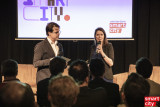
Last Thursday Amsterdam Smart City organized an open dialogue between its partners and Amsterdammers in Pakhuis de Zwijger. On the agenda: the Digital City. Because everyone deserves a seat at the table when it comes to shaping the digital city of tomorrow.
Leonie van den Beuken, the Program Director of Amsterdam Smart City, opens the night: ‘The changes necessary for the city and region to move forward, can only be achieved through collaboration. When it comes to driving innovations, we all depend on each other.’. With this night Amsterdam Smart City facilitates the conversation on the digital city between their partners (the City of Amsterdam, Nemo Kennislink, Tada) and interested citizens.
Personal freedom, inclusivity and creativity are the three main themes the City of Amsterdam focusses on in their ‘Digital City Agenda’. Responsible use of data is part of this. How do we gain control and ownership over our personal data in this transition to a Digital City? The City included the ‘Tada – data disclosed’ manifesto in the Agenda. Tada provides six principles to consider in the digital city: inclusive, control, tailored to the people, legitimate and monitored, open and transparent & from everyone, to everyone. ‘How far is the City in implementing these principles in its own organization?’ asks someone in the room. Practice what you preach: the City wants to set the right example by being the first municipality who puts the Tada manifesto into practice. Currently the City grades itself a 6/10 when it comes to implementing the manifesto. Still a long road ahead. Therefore Bart van de Sande (Innovation Officer, City of Amsterdam) invites everyone to send in their ideas on how to shape the Digital City.
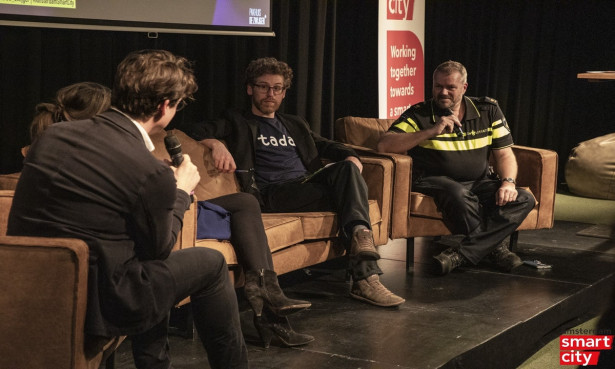
Douwe Schmidt (Boardmember,Tada) tries to activate citizens into the Digital City conversation: ‘Even though you don’t understand anything about technology or data, you are still entitled to decide on what happens to your personal data. You are entitled to have a say in this conversation.’. Nemo Kennislink is doing research on how to get citizens involved in the Digital City in collaboration with Amsterdam Smart City, VU University and AMS Institute. Research project is named Onderzoeksproject Catalyst, you can find more on this on our platform. Giovanni Stijnen (Senior Program Manager, Nemo) explains the research in three steps: i) activating citizens: using gamification or art to make the subject understandable; ii) verbalizing citizens: help people to articulate their vision on the Digital City; iii) connect & reflect: opening up the dialogue between citizens, policy makers and scientists – to get citizens involved in shaping their Digital City. Currently, they are in phase three of the project. Giovanni makes an appeal to the scientists and policy makers in the room: ‘*Do you want to participate in the dialogue with citizens? Contact me.*’
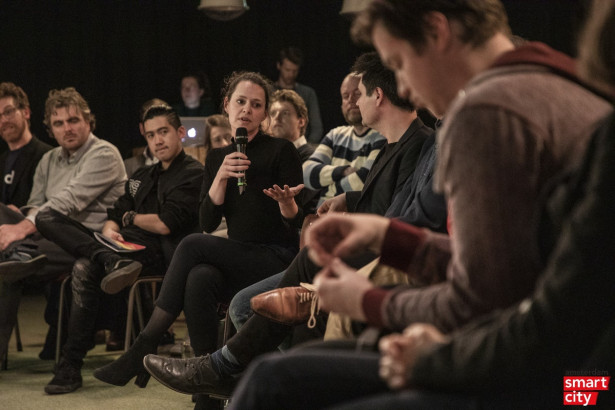
But why do we even want to transition to a more digitalized city? Daan Groenink (Innovation Officer, City of Amsterdam) and Marc Wiebes (Innovation manager, National Police) talk about the safety benefits of technology and data. Daan refers to the Digital Perimeter project (an Amsterdam Smart City project) in the Johan Cruijff ArenA area: ‘*Back in the day, we needed actual fences to regulate large numbers of people in a certain area. Nowadays, we can use smart sensors and smart cameras to assure safety. On the one side we can offer better services and experiences to the visitor, because the area is openly available. On the other side we can offer more safety in the area by using these technologies.’. Marc mentions an example of the City of Eindhoven: ‘The sensors send an automatic warning to the local police when they detect an unfriendly or aggressive tone. The police can respond directly to this warning. This decreases safety hazards.*’ The Digital Perimeter in the ArenA area will be a learning by doing project. That’s why the project needs your help: ‘How can we communicate to visitors that we are using smart technologies to guarantee safety? And how can we explain that we do not store and use personal data captured by the sensors and cameras?’ Post your best idea in the comments!
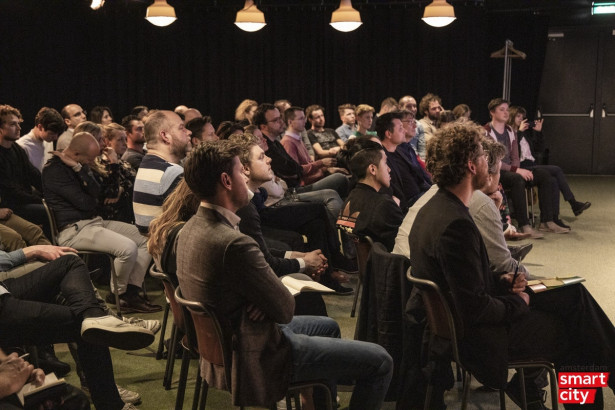
The next collaboration between Amsterdam Smart City and Pakhuis de Zwijger will be on the 23th of May. Did you miss the event? Don’t you worry.. You can watch the live feed at the website of Pakhuis de Zwijger (in Dutch):
V4 on the way to Smart Cities

Experts from V4 countries took part in the professional conference; David Bárta presented the National Concept of the Czech Republic in the field of Smart Cities in the form of public service innovations. Polish representative Mateusz Jarosiewicz discussed the possibilities of using Blockchain technology in cities. Milan Ftáčnik introduced the plans of the Smart Solutions and Innovation Council, which was created only a few weeks ago.
Full: https://smartcitiesklub.sk/v4-slovensko-na-ceste-k-smart-cities/
Common play with us!
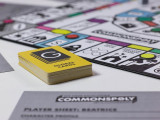
Tijdens deze ouderwets gezellige spelletjesavond maak je kennis met een aantal bordspellen die niet alleen competitie maar ook samenwerking, ethiek en sociale vraagstukken als thema hebben. Games for Good!
Een goed voorbeeld hiervan is Commonspoly. Het alternatief voor Monopoly, is gelanceerd tijdens ZEMOS98 festival hackcamp in Spanje en daarna doorontwikkeld tijdens Commons Fest in Athene. Het spel is gratis downloadbaar.
Daarnaast zullen we het spel Pandemic spelen, een zogenaamd coöperatief bordspel. Hierbij spelen de spelers mét in plaats van tegen elkaar om een gemeenschappelijk doel te bereiken.
Ook kijken we naar het Digitale Identiteits ganzenbord, waarin je duidelijk wordt gemaakt hoeveel persoonlijke data je dagelijks prijsgeeft aan grote internetplatforms.
Bedrijfsleven roept op tot samenwerking Smart City ontwikkeling
Veel pilots, veel projecten, veel aandacht, veel events maar ... waar blijft de brede toepassing? Hoe kunnen we de pilots opschalen, successen in andere steden toepassen?
Wat volgens het bedrijfsleven zal helpen, is een centrale regie gevoerd door overheid en bedrijfsleven.
Bekijk hier de video met de oproep.
Of ga naar de website https://nlsmartcities.com voor meer informatie en meer video's.
Smart Cities and Mobility Forum

THE EVENT
Our cities and mobility systems are on the edge of a decisive shift. New technology is already reshaping urban life as we know it, but the end result is yet unsettled. The framework, however, is clear. Cities have more pulling power than ever, and with it a growing responsibility to provide better decision making, better understanding and protection of the environment, and ultimately better user experience to rising citizen numbers.
The best solution that we know so far is smarter cities. Structures and local governments using data from citizens, devices, and assets to manage traffic, transportation systems, power plants, water supply networks, waste, law enforcement, information systems, schools, libraries, hospitals, and any other service for their citizens.
Many cities have begun this journey, but none have yet reached the final destination. Now is the time for conversation, connection and innovation, which will shape the future of cities and mobility systems. People are already informed and connected to everything, everywhere, all the time. Now is the time for city builders and the business to figure out what this means for the places we live and move in, and how they should respond.
Why Attend:
The annual SMART CITIES AND MOBILITY FORUM is already becoming the leading platform in SEE for the transforming mobility and urban living concepts. It is a meetup of the policy, business and citizen sectors, where you can get up to date with and explore new trends, business models and policies in urban development and mobility technology.
Key topics:
- smart city management
- green, electrical, autonomous mobility
- smart utilities
- smart and sustainable buildings and homes
Critical Making evening #1
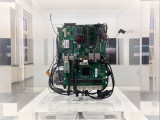
How can creative skills - art, design and technological culture - develop independently over an industrial and techno-optimistic logic? This evening is an introduction to Critical Making with presentations by Florian Cramer, Letizia Chiappini, Shailoh Phillips. Moderation by Lucas Evers.
The first Critical Making evening forms an introduction to the research into Critical Making as proposed in the project Bridging Art, Design and Technology through Critical Making.
The entrance fee is € 5,- incl. a drink. This evening is in English.
Programme
Introduction by Florian Cramer, specialized in the change of artistic disciplines in the 21st century. Globalization and the influence of new media fundamentally cast doubt on the systems of 'art' and 'design' in Western culture of the 19th and 20th century: for example through new forms of visual culture and the elimination of traditional frameworks of ownership and authorship. The focus of his research is on the transformation of autonomous art practices and of publishing in the post-digital era.
Letizia Chiappini of the University of Amsterdam and the University of Milan will present her research on urban change as a result of contemporary form of capitalism and the so-called sharing economy in relation to the meaning of so-called maker culture. In it she will address the question: 'What is the economy of Critical Making?'.
Shailoh Phillips, one of the researchers of the project, invites the audience to a session of 'unmaking', 'dismantling', disassembling, breaking up, deconstructing things, to create a different understanding about it. A session that is related to a motto derived from the Maker Manifesto: 'If you can not open it, you do not own it'. An activity that questions the provenance, ownership and manufacturing process of utensils.
The evening is moderated by Lucas Evers of Waag.
What the project aims at is introduced by Florian Cramer. Cramer also looks ahead to the programme of the first symposium that the project organizes and that will take place on May 8 and 9 at West Den Haag, in the former American Embassy. The focus of the first symposium will be on the concept of 'Making' and the questions surrounding it, where the next symposium will focus much more on questions about the concept 'Critical' and criticality.
Bridging Art, Design and Technology through Critical Making is a program supported by NWO and a collaboration between Leiden University (Janneke Wesseling), Hogeschool Rotterdam (Florian Cramer), Het Nieuwe Instituut (Klaas Kuitenbrouwer), Waag - Technology & Society (Lucas Evers), West The Hague (Marie-José Sondijker) and with researchers Anja Groten, Shailoh Phillips, Pia Louwerens and Dani Ploeger.
How do you build privacy-friendly systems?
Suppose you want to know how many cars travel across a certain road. You could build a system that registers all license plates driving by. But you could opt for a system that will simply place a tally mark for every car that passes by. Both systems serve the same function: they count cars. However, the first one is a privacy nightmare. The second system is designed in such a way that it cannot document any personal information. Privacy is not a factor that you can just tack on a system after the fact; it needs to be included in the design phase as a requirement. This design philosophy is called privacy-by-design. Can we work towards Tada-by-design?
We think we can.
Read all about it on the Tada blog:
De techniek achter de smart city

Deze bijeenkomst is onderdeel van het Smart Stedenbouw project van de Future City Foundation.
Het doel van deze bijeenkomst is de technische kant van de smart city belichten. Technologie is datgene wat de veranderingen die we bespreken teweegbrengt.
Technologie wordt steeds goedkoper. Deze technologie is dankzij het internet altijd verbonden. En er wordt daarmee continu data verzameld. Met behulp van data kunnen we nieuwe inzichten en kennis vergaren over hoe onze steden functioneren. En dus over hoe we ze moeten ontwerpen.
Wat we willen is concrete voorbeelden geven. Wat is er daadwerkelijk aan het veranderen? Aan de hand van voorbeelden schetsen we de impact van technologie. In combinatie met een praktijkvoorbeeld, waarbij we een kijkje in de keuken van Picnic krijgen.
Het programma
> Wat Seminar Techniek
> Wanneer 21 maart
> Waar Zandfoort aan de Eem, Eemlaan 100, 3812 ED Amersfoort
> Voor wie Geïnteresseerden in smart stedenbouw
> Thema Technologische ontwikkelingen en de impact hiervan
> Introductie technologie en standaarden | Arjen Hof (Civity)
> Hoe kunnen we data benutten? | Bert Vermeij (ESRI)
> Hoe vertalen we dit naar beleid? | Bert Beentjes (Kadaster)
> Excursie naar Picnic!
Inschrijven kan door te mailen naar richelle@future-city.nl
Tada and the City of Amsterdam: The first six months.
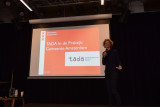
From https://tada.city - Reading time: 6-8 minutes
“Tada is a movement,” says Douwe Schmidt during the opening of the Tada in practice meeting. “It is the interaction of a large number of organizations and individuals that are focusing on the question: ‘What kind of digital society do we want?’ It is no longer a matter of determining whether or not we will have one. Now it is all about how to put that society into practice.” Over the past four months, the Municipality of Amsterdam and Bureau Tada have worked together to explore how the six Tada values can be put into practice. At the meeting, insights were shared with nearly sixty participants.
The practical implementation of Tada does not translate into a one size fits all approach. Unlike prescriptive legislation such as the General Data Protection Regulation, Tada is not a user manual that provides specific rules. Ethical principles like ‘the human factor’ and ‘from everyone – for everyone’ are soft values that need to be reinterpreted time and again. “Ethics cannot be outsourced,” says Tessa Wernink, who partners with Schmidt in Bureau Tada. “It is important for everyone to think about that in their work. Tada has taken the first steps by formulating six principles. These six points are not much different than established ethical values. But now it is a matter of applying them to the digital domain.”
“It is allowed, but we won’t do it”
Two speakers share stories from their own practice. Koen van Nol, legal expert at Schiphol, is involved in a pilot project involving ‘biometric boarding’ at the airport. In the experiment, boarding pass checks and passport checks are replaced with facial recognition. One of the insights Van Nol shares is that your organization’s identity plays a role in the decision-making process. “At each step, we verify whether it is legally allowed and whether it is technically possible. But in some cases, we reach the conclusion: it is allowed, it is possible, but we are not going to do it. That has to deal with the Schiphol identity. I have noticed in conversations with colleagues that Schiphol employees consider that very important. As a semi-government body, we believe that we hold a certain responsibility towards our customers.”
Jaap-Henk Hoepman, senior university lecturer at Radboud University in Nijmegen, explains how to make abstract values more tangible, transposing them into technical projects: “Privacy is a soft term. It is partly about ethics and partly about legal aspects. That makes it harder to implement than more tangible software attributes like security or performance.” To offset that, Hoepman developed eight privacy-by-design strategies. One of those strategies is minimization: do not collect more data than necessary. Another is abstraction: only share the specific information that is needed. For instance: the Gall&Gall sales employee does not actually need to know your date of birth; they just need to know if you are over 18.
Lessons Learned
G4 trainee Milou Jansen then stepped up on stage. For six months, she worked with Tada Agency on implementing Tada in the Municipality of Amsterdam, adopting the role of Values & Digitalization consultant. She shared some insights that recurred frequently during that project: Decisions about responsible data use must be taken at all levels of the organization. However, it is still all too common to see such decisions ending up with the data analysts. This could result in the unintended situation where data analysts become some type of gatekeepers, who need to encourage other people to use data responsibly. It is important for other employees to also consider this their responsibility. As a result, thinking about data use becomes an integrated part of everyone’s work. By extension, clients and contractors share a joint responsibility for data use. It is therefore important to discuss this at the beginning of a project. Take the time early in the process to carefully consider everything together. That will prevent delays later on in the process: take a moment to think at the start so you can accelerate later.
What can we do in tangible terms?
Milou Jansen bids farewell to the Municipality of Amsterdam to continue her traineeship in Utrecht. That is why she invited the attendees to join her in considering the question: ‘what next?’ during the interactive part of the meeting. The attendees joined in a discussion about applying Tada in the Municipality of Amsterdam. The discussion clearly revealed two things. On the one hand, it was considered valuable that Tada does not provide strict guidelines, but rather requires constant reflection. On the other hand, there is also a need for certainty – not just for civil servants, but also for citizens who need to be able to monitor what the municipal authorities are doing. People offered ideas related to both aspects in order to anchor Tada in the organization.
First, people in the organization need to become aware of Tada. Communication as well as meetings arranged within the organization will help create support amongst municipal employees. That should lead to a sense of responsibility which is felt by all the process owners, not just the specialists. Tada is not an exact science, so it requires employees to use their moral compass. That takes time: time to think, time to engage in dialogue, time to ask each other questions. People also mentioned developing a course on Tada, ethics and technology, and appointing ambassadors.
A number of suggestions were also made for ways to express Tada in more tangible terms. Pick a spot on the horizon: what is our course of action with Tada? Based on that distant view, we can draw up clear policy frameworks and work processes. Also appoint watchdogs that monitor the Municipality – like consultative groups, ethical advisory committees or a digital union. Finally, someone suggested expressing the abstract Tada values in more tangible terms by providing examples from actual practice. That will create common ground based on examples.
The conclusion of the overall discussion was that a cultural change is needed. The word Tada should not evoke confused questions; instead, it should be met with enthusiastic recognition. Not: Tada? But: Tada!
The Tada in practice meeting was a co-production of the Municipality of Amsterdam and Bureau Tada. It took place on 20 February 2019 at the Stadstimmertuin in Amsterdam.
Stay up to date
Get notified about new updates, opportunities or events that match your interests.

